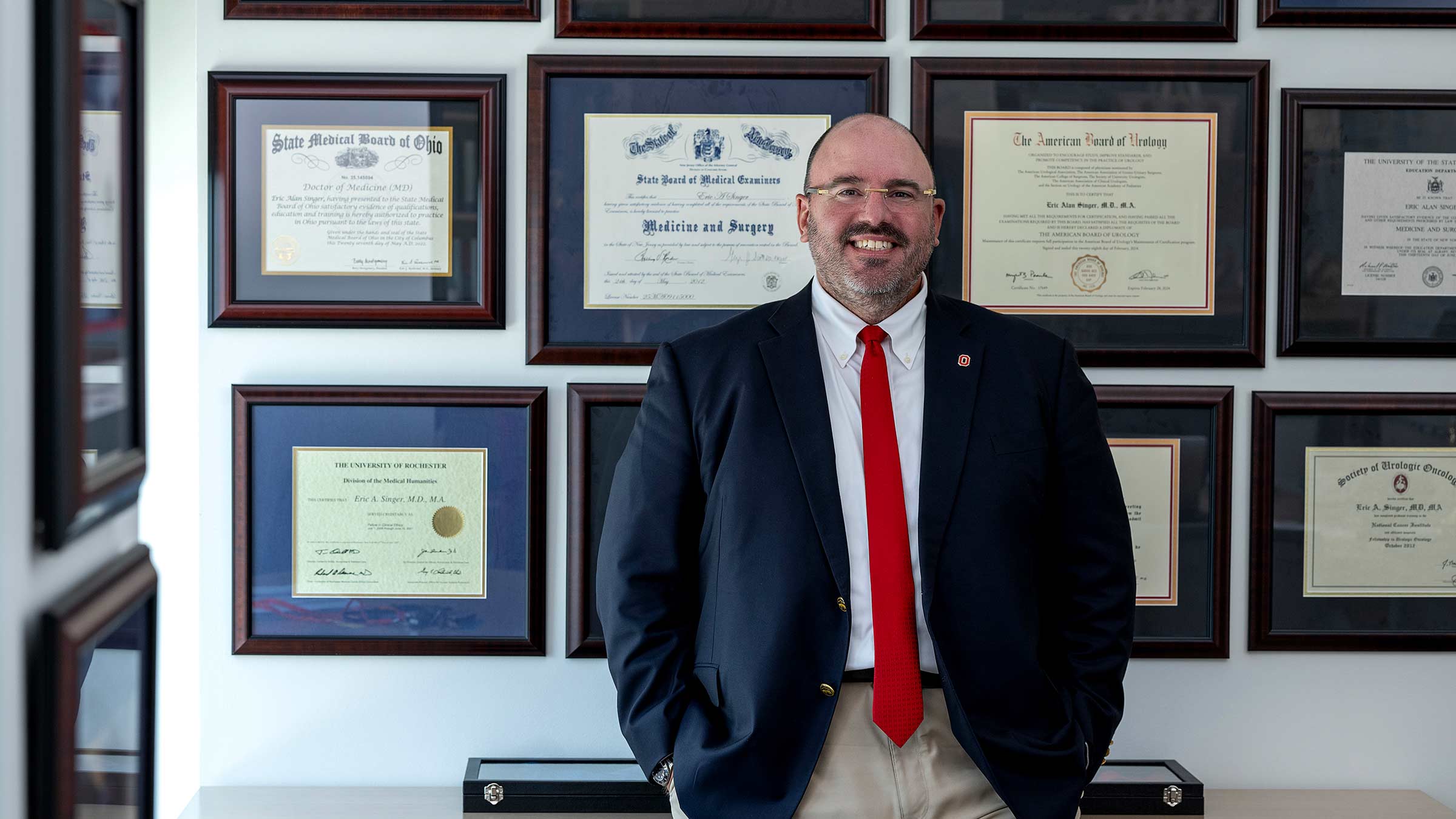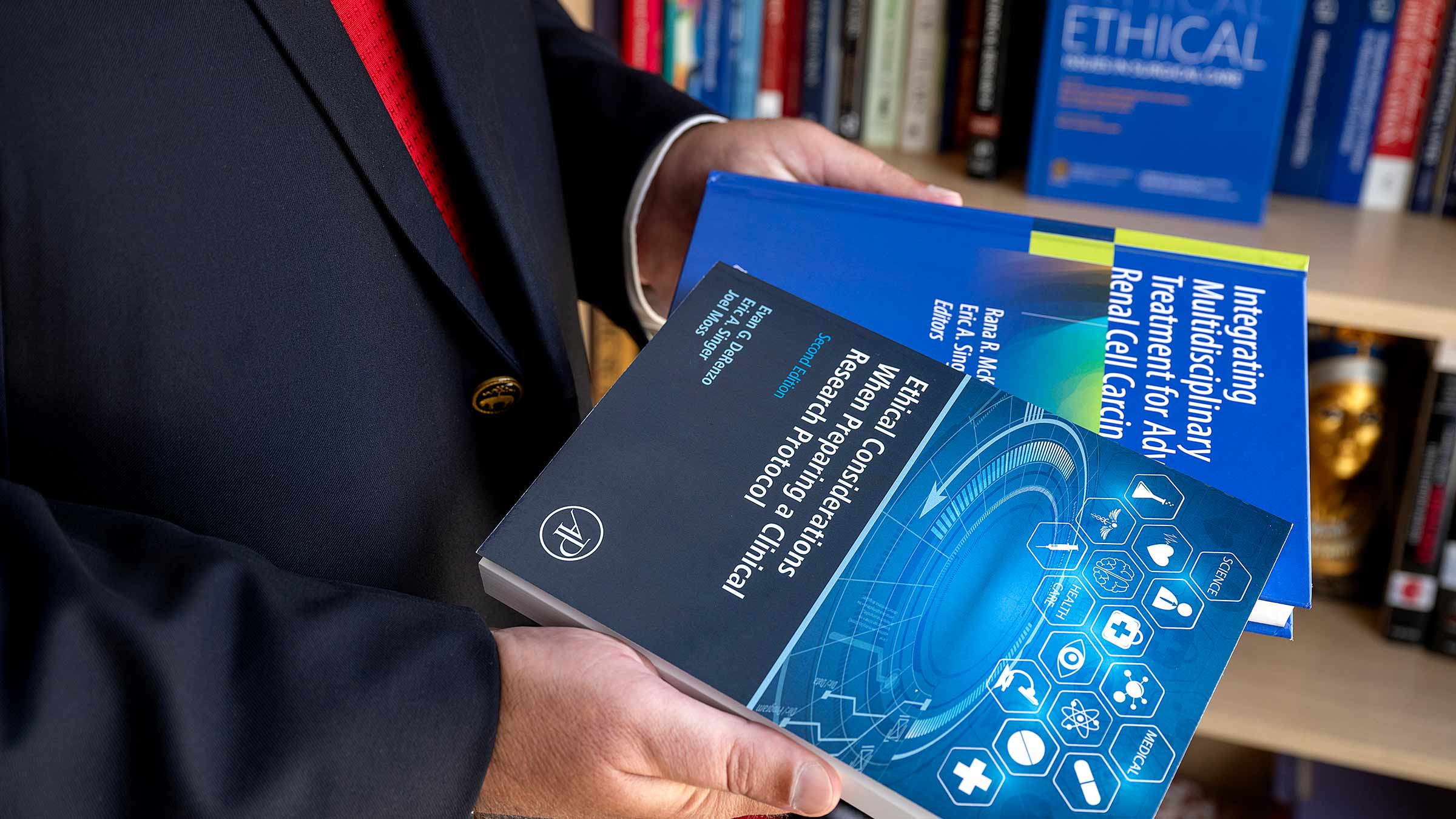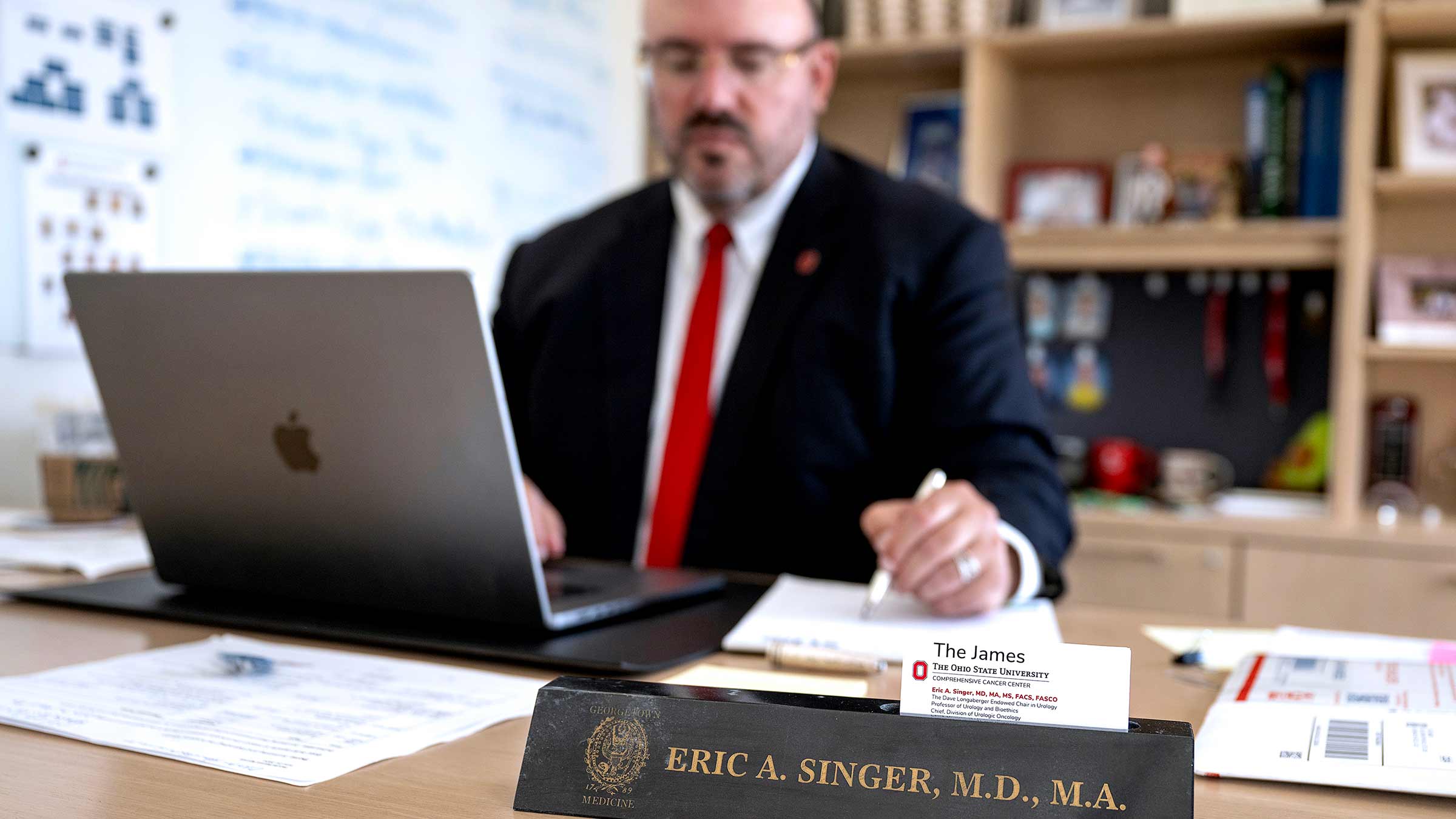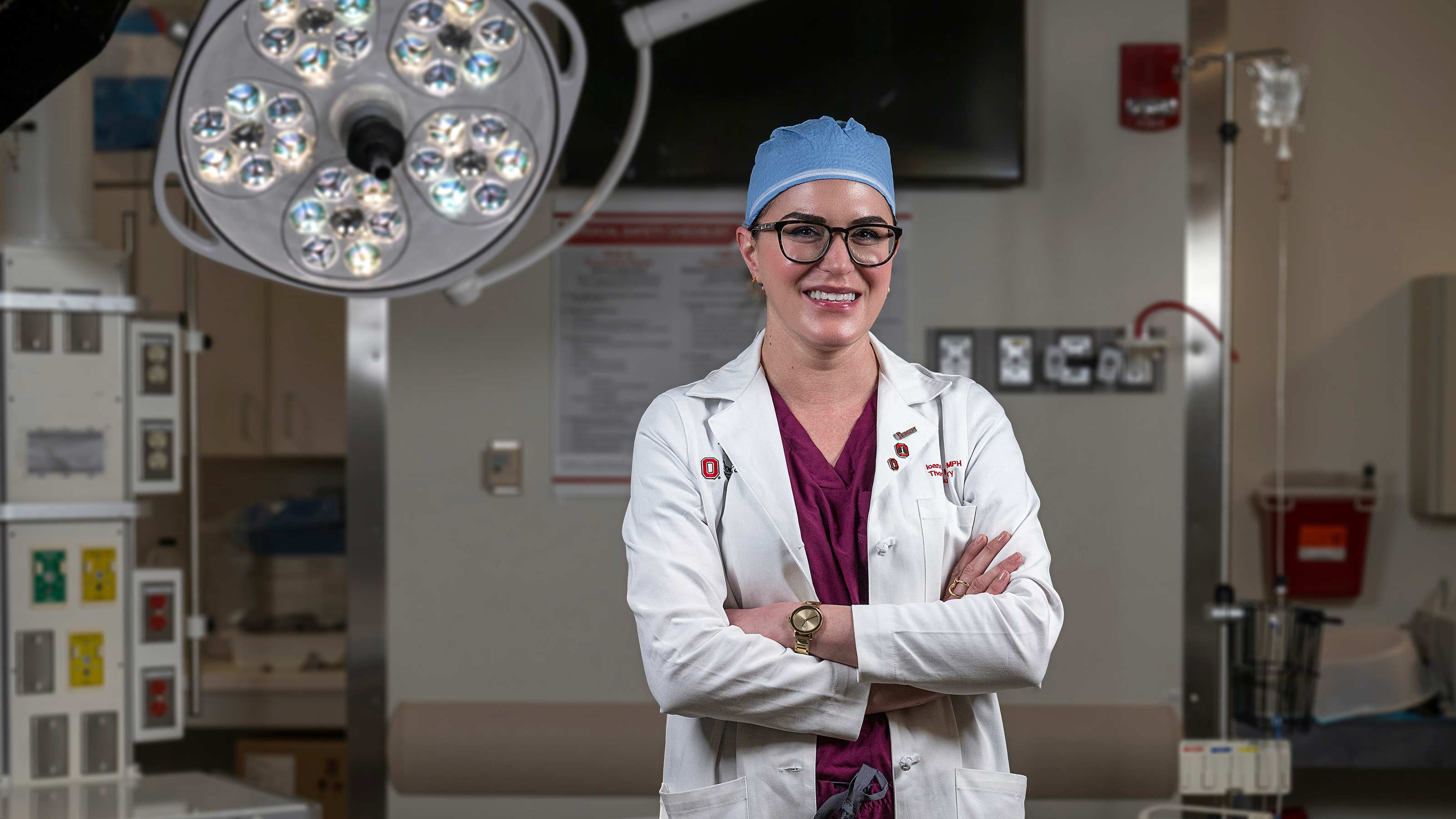Solving the most challenging problems in urologic cancer
Prominent surgeon and researcher aims to make treatment more effective and tolerable for kidney cancers.
Dr. Eric Singer can trace the start of his career as a urologic oncology surgeon and researcher back to his teenage gridiron injuries in Pompton Lakes, New Jersey.
“When I was in high school, I had two shoulder surgeries that put an end to my football career, and I spent so much time in physical therapy that they said, ‘Hey, do you want a summer job?’” he recalls. “That was my foray to working in physical therapy in a hospital. I also completed my emergency medical technician (EMT) training and, at age 16, began volunteering with the Pompton Lakes – Riverdale First Aid Squad. Caring for community members was incredibly rewarding. At that point, I knew I wanted to pursue medicine.”
After completing his medical training, he spent a decade at Rutgers Cancer Institute before he was recruited in 2022 as founding director of the Division of Urologic Oncology at OSUCCC – James.

Playing key roles in studies that improve cancer treatment
As a clinician and researcher at the OSUCCC – James, Dr. Singer works to create treatments that are more effective, more tolerable, have fewer side effects and provide a better quality of life.
Current kidney cancer projects that he’s excited about include:
- An ongoing multicenter trial that tests the safety and effectiveness of a new noninvasive procedure that uses focused ultrasound to destroy tumor tissue in patients with renal cell carcinoma. So far, three successful procedures have been completed at Ohio State by a team led by Dr. Singer and interventional radiologist Mina Makary, MD.
- A phase II multicenter trial called Cyto-KIK. Patients with metastatic kidney cancer (spread beyond the kidney) receive a combination of immunotherapy and targeted therapy for three months before surgical removal of the primary kidney tumor, followed by a return to the medications after surgery. “The idea is that exposing patients to the medicines while the big tumor is still in place will help the immune system better recognize the cancer after surgery,” Dr. Singer says, adding that the trial recently closed to patient enrollment, and data analysis is underway.
- A new trial that provides a combination of medications for patients who may have a high risk of cancer returning after surgery. “I helped with previous trials that looked at different medicines within this patient population, but this time we’re combining two drugs instead of using just one, in hopes of achieving even better results,” Dr. Singer says.
The OSUCCC – James also played a key role in a National Cancer Institute (NCI) study that has found a possible new treatment for advanced forms of kidney cancer that lack effective therapies. Dr. Singer was a senior co-author of the study, which was published in the New England Journal of Medicine.
The study involved a phase II clinical trial that showed the efficacy of combining two drugs in 43 patients with advanced hereditary leiomyomatosis and renal cell cancer (HLRCC)-associated papillary renal cell carcinoma, and in 40 patients with sporadic (nonhereditary) papillary renal cell carcinoma. Most patients with these aggressive kidney cancers die of progressive disease.
Of the 43 patients with HLRCC-associated renal cell carcinoma, 31 had a confirmed response (72%); of the 40 patients with sporadic papillary renal cell carcinoma, 14 had a confirmed response (35%). “This trial is an important landmark for the management of papillary renal cell carcinoma through this novel combination,” Dr. Singer says.
Considering a career course
Although he became interested in medicine while in high school, Dr. Singer was long uncertain about a specialty. But he did have an interest in surgery, so he went to Boston College, where he earned a degree in biology and worked in a surgical laboratory at Brigham and Women’s Hospital.
After he entered medical school at Georgetown University, his interests were swayed by two factors: a continuing fascination with bioethics (ethical issues relating to health), and his sister Carole’s diagnosis of advanced ovarian cancer.
Between his second and third years of medical school, he took time out to earn a master’s degree in bioethics. Why the interest in this discipline?
“I thought they asked the really important questions; for example, not just, ‘Can we?’ but ‘Should we?’ Also, ‘How do we make sure that what we’re doing is advancing the goals of the patient?’” Dr. Singer says. “Surgery can do some amazing things, but it can also present significant risks. So how do we make sure we’re informing patients properly about their realistic outcomes?”

At about the same time, Carole’s cancer diagnosis sparked his interest in oncology.
“Seeing her and her husband and kids navigating the oncology health care system, and seeing some caregivers who were incredibly inspirational and compassionate — as well as others who didn’t have those characteristics — made me want to become an oncologist whom my sister would want to see,” he says, noting that Carole, a psychiatric nurse specialist, died in 2003.
Choosing urologic oncology
“The truth is that when I entered medical school, I didn’t even know what urology was,” Dr. Singer admits. “But when I did my urology rotation, I realized this was the field for me: challenging surgeries, lots of cancer work, fantastic long-term relationships with patients and families — all this made me say, ‘Yes, urologic oncology!’”
After earning his medical degree, Dr. Singer completed six years of surgical training at the University of Rochester. There, he says, was “where I had the good fortune to meet my wife, Kathryn,” who was a nurse in the post-anesthesia care unit there, and who is now a part-time nurse practitioner at The James. She’s also enrolled in The Ohio State University College of Nursing’s Doctor of Nursing Practice Program. They have two teenagers, Caroline and Ethan.
Dr. Singer then completed three years of urologic oncology training at the NCI, which he calls “a springboard to my next adventure” at Rutgers Cancer Institute.
“I later learned that Ohio State was looking for someone to start a division of urologic oncology, create a urologic oncology fellowship, expand clinical trials and research, and I thought, ‘This is really resonating with me,’” he says, pointing out that he’d first learned about the OSUCCC – James while at Rutgers.

“Often when there were thoughts about implementing a new program or doing quality improvement, there were discussions about, ‘What do they do at The James?’” he says. “I’d heard good things about the cancer program here, the great culture, the amazing resources, the deeply committed faculty. Kathy and I knew this was a great opportunity for both of us to take the next steps in our careers.”
New urologic oncology division has immediate impact
Dr. Singer leads an expanded team of nine urologic oncologists, “but we’re recruiting, so my hope is that we will be at 12 within three years, which would put us at the top of size across the country,” he says.
“I can’t speak highly enough about the amazing team we have, and I’m privileged to be part of it. It’s also incredibly rewarding to help patients who come to us from near and far with some of the most challenging problems in urology,” Dr. Singer says.
Since his arrival, he has established a program that awards two-year fellowships from the Society of Urologic Oncology to help train the next generation of urologic surgeons, and he co-directs the Genitourinary (GU) Disease-Specific Research Group with J. Paul Monk, MD, a professor in the Division of Medical Oncology and a member of the Translational Therapeutics Program.
“Dr. Monk and I are responsible for maintaining a balanced, robust research portfolio,” Dr. Singer says. “We try to make sure we have clinical trial options for patients with all different GU cancer types, the most common being prostate, kidney and bladder/urothelial.
“We also work to have trials for all the different disease states, such as patients who have never been treated, or whose disease has progressed despite multiple lines of therapy, or who will receive combined surgery and systemic therapy, or who will receive postsurgical treatment to prevent recurrence. We need better options for many of the populations we treat,” he continues.

A lifelong love of learning continues at Ohio State
“It’s great fun being a Buckeye,” Dr. Singer says, explaining that he appreciates the abundant spirit and enthusiasm, as well as the strong community support exemplified by movements such as Pelotonia, the annual community and cycling event series that raises millions of dollars for cancer research. Dr. Singer received Pelotonia funds for his research startup at the OSUCCC – James. To give back, he rode in his third Pelotonia with the GU Full Stream Ahead peloton, a part of Team Buckeye.
“What most excites me about being here is having a chance to develop relationships with patients and families, and finding ways to help them survive cancer,” Dr. Singer says.
“As (OSUCCC – James CEO) Dr. Kimryn Rathmell has said, just as Ohio State expects a winning football team, we also expect a championship-caliber cancer program, so we have to come through for our patients.”

We’re creating a cancer-free world
Our experts develop and deliver the most advanced targeted treatments leading to better outcomes and more hope.
Learn More



